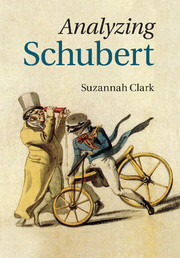1 - Singing Schubert???s praises
the voice of Vogl in Schubert’s early history
Published online by Cambridge University Press: 07 September 2011
Summary
For nearly a quarter of a century, Johann Michael Vogl (1768–1840) was the voice of Schubert’s songs. He was the first to bring them to the stage; he made the Erlkönig his showpiece and the songs his life. According to some, he was also the last to preserve the style of singing cherished in Schubert’s day. However, Vogl not only sang Schubert’s songs in a distinctive way, he also, as it were, sang his praises using a distinctive message about the nature of Schubert’s genius. As this chapter will show, this other voice of Vogl would prove to be far less ephemeral than his musical performances. It echoes throughout the memoirs of Schubert’s friends and acquaintances and can be heard in early historical accounts of his music. It is traceable in the anecdotes of those who, after Schubert’s death, claimed to have met him but clearly had not. It can be perceived in the image of Schubert as a composer that has persisted to this day, and it continues to influence the way in which we analyze his music.
Vogl’s message is best summarized by one of his own diary entries, in which he writes that Schubert’s songs are “truly divine inspirations . . . products of musical clairvoyance.” Throughout his own life and especially after Schubert’s death (as much documentary evidence indicates), Vogl was heard to have characterized Schubert’s music in this way at every opportunity. Indeed Vogl was so intimately associated with the view of Schubert as a clairvoyant genius that whenever anyone sought to address Schubert’s method of composition, they cited Vogl as their authority. For instance, as Anton Steinbüchel von Rheinwall once recalled, whenever Schubert was “absorbed and lost, one would hear Vogl’s usual remark spoken in an undertone, ‘You see the man has no idea what goes on inside him! It is an inexhaustible flood!’” Around 1850, some ten years after Vogl’s death, his wife Kunigunde reminisced that he was “always of the opinion that Schubert was in a kind of trance-like state whenever he composed.” She went on to specify that the knowledge (or wisdom) that may resound in Schubert’s music is not that which the composer himself fully possessed: she thought this explained “how, in this state of clairvoyance, the scarcely educated boy, and later the only moderately educated youth, had glimpses into the secrets of life, feeling and knowledge.” As these reminiscences show, the key aspects of Vogl’s growing story about Schubert were that the composer was a passive vessel through which divine inspiration passed and that he had little understanding of his own music.
- Type
- Chapter
- Information
- Analyzing Schubert , pp. 6 - 55Publisher: Cambridge University PressPrint publication year: 2011



